英语九年级全一册语法.doc
人教版九年级全一册英语Unit6重点语法知识点总结

人教版九年级全一册英语Unit6重点语法知识点总结Unit 6 When was it invented?Section A(1a~2d)_必记单词ⅢⅢ1. heel n.鞋跟;足跟【例句】His heel is raw because his shoe does not fit well. 因鞋子不合适,他的脚后跟擦破皮了。
2. scoop n. 勺;铲子【例句】He used a scoop to scrve the ice cream. 他用铲子来吃冰激凌。
3. electricity n.电;电能【例句】While I was cooking supper, the electricity went off.我正在做晚饭时停电了。
【联想】electrical adj.电的,与电有关的4. style n.样式;款式【例句】The style of this skirt is just in season.这条裙子的款式正当时令。
【搭配】out of style 过时的|| in style 流行;时髦地5. project n.项目;工程【例句】The project is proceeding as planned. 工程正在按计划进行。
【联想】projection n.设计;规划;放映6. pleasure n.高兴;愉快【例句】He didn't show any pleasure when I offered to go withhim.我提出和他一起去,他并没有表示出高兴的样子。
【搭配】pleasure in... 以……为荣‖with pleasure 乐意效劳It's a /my pleasure.不客气。
【注意】pleasure 多用作不可数名词,当做“快乐的事,乐事”解时用作可数名词。
7. zipper n.(=zip) 拉链;拉【例句】The zipper is red.这条拉链是红色的。
初三(九年级)英语语法大全
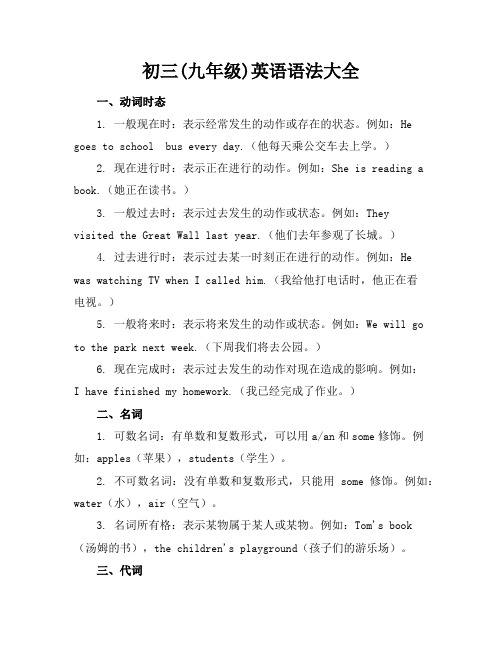
初三(九年级)英语语法大全一、动词时态1. 一般现在时:表示经常发生的动作或存在的状态。
例如:He goes to school bus every day.(他每天乘公交车去上学。
)2. 现在进行时:表示正在进行的动作。
例如:She is reading a book.(她正在读书。
)3. 一般过去时:表示过去发生的动作或状态。
例如:Theyvisited the Great Wall last year.(他们去年参观了长城。
)4. 过去进行时:表示过去某一时刻正在进行的动作。
例如:He was watching TV when I called him.(我给他打电话时,他正在看电视。
)5. 一般将来时:表示将来发生的动作或状态。
例如:We will go to the park next week.(下周我们将去公园。
)6. 现在完成时:表示过去发生的动作对现在造成的影响。
例如:I have finished my homework.(我已经完成了作业。
)二、名词1. 可数名词:有单数和复数形式,可以用a/an和some修饰。
例如:apples(苹果),students(学生)。
2. 不可数名词:没有单数和复数形式,只能用some修饰。
例如:water(水),air(空气)。
3. 名词所有格:表示某物属于某人或某物。
例如:Tom's book(汤姆的书),the children's playground(孩子们的游乐场)。
三、代词1. 人称代词:I(我),you(你/你们),he(他),she(她),it(它),we(我们),they(他们)。
2. 物主代词:my(我的),your(你的/你们的),his(他的),her(她的),its(它的),our(我们的),their(他们的)。
3. 指示代词:this(这个),that(那个),these(这些),those(那些)。
人教版九年级全一册英语Unit10重点语法知识点总结
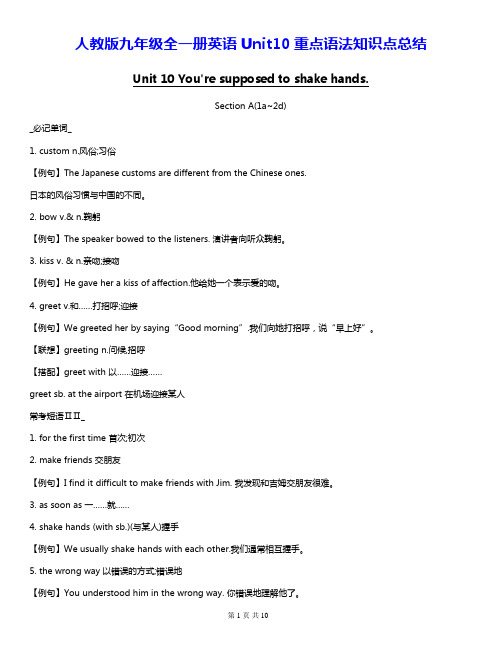
人教版九年级全一册英语Unit10重点语法知识点总结Unit 10 You're supposed to shake hands.Section A(1a~2d)_必记单词_1. custom n.风俗;习俗【例句】The Japanese customs are different from the Chinese ones.日本的风俗习惯与中国的不同。
2. bow v.& n.鞠躬【例句】The speaker bowed to the listeners. 演讲者向听众鞠躬。
3. kiss v. & n.亲吻;接吻【例句】He gave her a kiss of affection.他给她一个表示爱的吻。
4. greet v.和……打招呼;迎接【例句】We greeted her by saying“Good morning”.我们向她打招呼,说“早上好”。
【联想】greeting n.问候,招呼【搭配】greet with 以……迎接……greet sb. at the airport 在机场迎接某人常考短语ⅡⅡ_1. for the first time 首次;初次2. make friends 交朋友【例句】I find it difficult to make friends with Jim. 我发现和吉姆交朋友很难。
3. as soon as 一……就……4. shake hands (with sb.)(与某人)握手【例句】We usually shake hands with each other.我们通常相互握手。
5. the wrong way 以错误的方式;错误地【例句】You understood him in the wrong way. 你错误地理解他了。
6. hold out 伸出(手等)7. greet each other 互相问候8. to one’s surprise 令某人惊讶的是经典句型ⅢⅡ1. That's how people in Japan are expected to greet each other.那就是在日本人们互相问候的方式。
人教版九年级英语全一册:Unit 2 语法知识点复习提纲(全面,必备!)
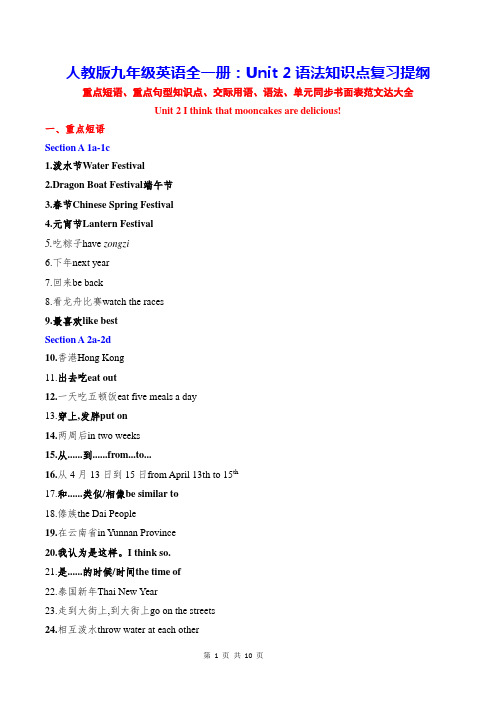
人教版九年级英语全一册:Unit 2语法知识点复习提纲重点短语、重点句型知识点、交际用语、语法、单元同步书面表范文达大全Unit 2 I think that mooncakes are delicious!一、重点短语Section A 1a-1c1.泼水节Water Festival2.Dragon Boat Festival端午节3.春节Chinese Spring Festival4.元宵节Lantern Festival5.吃粽子have zongzi6.下年next year7.回来be back8.看龙舟比赛watch the races9.最喜欢like bestSection A 2a-2d10.香港Hong Kong11.出去吃eat out12.一天吃五顿饭eat five meals a day13.穿上,发胖put on14.两周后in two weeks15.从......到......from...to...16.从4月13日到15日from April 13th to 15th17.和......类似/相像be similar to18.傣族the Dai People19.在云南省in Yunnan Province20.我认为是这样。
I think so.21.是......的时候/时间the time of22.泰国新年Thai New Year23.走到大街上,到大街上go on the streets24.相互泼水throw water at each other25.each other/one another彼此,互相26.是用来......的时间be a time for27.冲走,洗掉,冲洗wash away28.拥有好运have good luck29.在新的一年里in the new yearSection A 3a-3c30.庆祝中秋节celebrate the Mid-autumn Festival31.中秋节Mid-autumn Day/Festival32.吃月饼enjoy mooncakes33.呈......的形状be in shape of34.一轮满月a full moon35.寄托着对......的祝愿/祝福carry people’s wishes to36.传统的民间故事traditional folk stories37.射下shoot down38.仙药,仙丹,魔药magic medicine39.永生,长生不老live forever40.飞到/向月球fly up to the moon41.如此......以至于......so ...that...42.对着......呼喊/喊叫某人的名字call out sb’s name to43.摆开,布置lay out44.在花园in the garden45.回来come back46.此后,之后after this47.......的传统the tradition of48.赏月admire the moon49.和某人品/吃月饼share mooncakes with sb.50.在地球上on the earth51.在夜里at night52.结果as a resultSection A Grammar Focus-4c53.举行龙舟,比赛have the races54.dragon boat team龙舟队55.......的好时候/间be a good time56.龙舟,龙船dragon boats57.回家come home58.母亲节Mother’s Day59.在五月的第二个星期天on the second Sunday of May60.父亲节Father’s Day61.在六月的第三个星期天on third Sunday of June62.给每人送礼物give gifts to sb.63.普通的礼物common gifts/presents64.庆祝母亲节celebrate Mother’s Day65.庆祝父亲节celebrate Father’s Day66.在中国in China67.在那边over there68.送给某人类似的礼物give similar gifts to sb.69.必须,不得不have to70.花大量的钱spend a lot of money71.好主意great/good ideaSection B 1a-1d72.乔装,打扮dress up73.鬼屋haunted house74.黑猫black cat75.不请吃就捣蛋trick or treat76.庆祝万圣节,过万圣节celebrate Halloween77.认为,考虑,思考,想到think of78.关闭turn off79.关灯turn off the lights80.把......放在门边put...around the door81.装扮成dress up as82.卡通人物/角色cartoon characters83.附近的街区around the neighborhood84.要求,询问,要ask for85.捉弄某人play a trick on/upon86.招待某人give sb. a treat87.了解learn aboutSection B 2a-2e88.《圣诞赞歌》A Christmas Carol89.圣诞节的精神/真谛the spirit of Christmas90.圣诞树Christmas trees91.圣诞老人Santa Claus92.在于/存在于......的真谛lie the true meaning of93.......的重要性the importance of94.......的最好范例/典范/榜样/例子the best example of95.短篇小说short novel96.考虑自己,自私think about oneself97.关心,在乎care about98.圣诞节前夕Christmas Eve99.......的鬼魂/魂魄the ghost of......100.合伙人,生意伙伴business partner101.最终成为end up102.改变某人的生活方式change one’s way103.圣诞节过去之灵/精灵/魂the Ghost of Christmas Past 104.把某人带回到take sb. back to105.让某人想起remind sb. Of106.圣诞节现在之魂/精灵/灵the Ghost of Christmas Present 107.带某人去......take sb. to ...108.最后一个the last one109.圣诞节未来(将来)之灵/精灵/魂the Ghost of Christmas Yet 110.睡醒,唤醒wake up111.找出,找到,查明find out112.第二天早上the next morning113.圣诞节Christmas Day114.圣诞节快乐Merry Christmas115.在危难中,在危急中,急需,需要in need116.改变某人的生活chang e one’s life117.......的精神/真谛the true spirit of118.圣诞节的真谛/的真正精神the true spirit of Christmas Day119.有很多的朋友have a lot of friendsSection B 3a-Self Check120.西方国家Western countries121.庆祝复活节celebrate Easter122.在......之间between ...and...123.新生命的诞生/开始the beginning of new life124.下蛋lay out125.孕育生命give birth to life126.新生命的象征be a symbol of new life127.不但......而且.....not only...but also...128.分发,散发give out=hand out129.到处分散,到处传播spread ...around130.create good business for为......带来/创造良好的生意二、重点句型知识点Section A标题句型1.I think that mooncakes are delicious!我认为月饼很美味。
人教版九年级全一册英语Unit4单元语法知识点总结
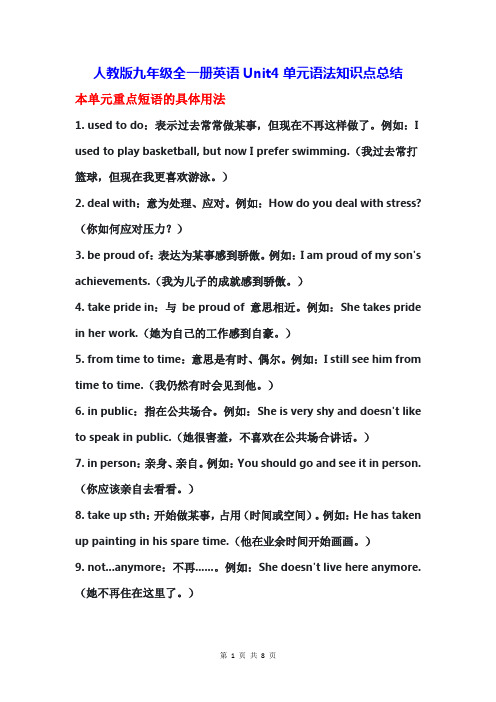
人教版九年级全一册英语Unit4单元语法知识点总结本单元重点短语的具体用法1. used to do:表示过去常常做某事,但现在不再这样做了。
例如:I used to play basketball, but now I prefer swimming.(我过去常打篮球,但现在我更喜欢游泳。
)2. deal with:意为处理、应对。
例如:How do you deal with stress?(你如何应对压力?)3. be proud of:表达为某事感到骄傲。
例如:I am proud of my son's achievements.(我为儿子的成就感到骄傲。
)4. take pride in:与be proud of 意思相近。
例如:She takes pride in her work.(她为自己的工作感到自豪。
)5. from time to time:意思是有时、偶尔。
例如:I still see him from time to time.(我仍然有时会见到他。
)6. in public:指在公共场合。
例如:She is very shy and doesn't like to speak in public.(她很害羞,不喜欢在公共场合讲话。
)7. in person:亲身、亲自。
例如:You should go and see it in person.(你应该亲自去看看。
)8. take up sth:开始做某事,占用(时间或空间)。
例如:He has taken up painting in his spare time.(他在业余时间开始画画。
)9. not...anymore:不再......。
例如:She doesn't live here anymore.(她不再住在这里了。
)10. worry about:担心、担忧。
例如:Don't worry about the exam, just do your best.(不要担心考试,尽力就好。
(完整word版)九年级英语语法全一册【!!】

Unit11. by + doing 通过……方式如:by studying with a groupby 还可以表示:, ,"在…期间"、"乘车"等如:I live by the river. "在…旁"I have to go back by ten o'clock. "靠近"The thief entered the room by the window. "经过"The student went to park by bus. "用,",2. talk about 谈论,议论,讨论如:The students often talk about movie after class. 学生们常常在课后讨论电影。
talk to sb. === talk with sb. 与某人说话3.提建议的句子:①What/ how about +doing sth.? 如:What/ How about going shopping?②Why don't you + do sth.? 如:Why don't you go shopping?③Why not + do sth. ? 如:Why not go shopping?④Let's + do sth. 如:Let's go shopping⑤Shall we/ I + do sth.? 如:Shall we/ I go shopping?4. a lot 许多常用于句末如:I eat a lot. 我吃了许多。
5.too…to 太…而不能常用的句型too+adj./adv. + to do sth.如:I'm too tired to say anything. 我太累了,什么都不想说。
人教版九年级英语全一册十二单元语法与短语总结
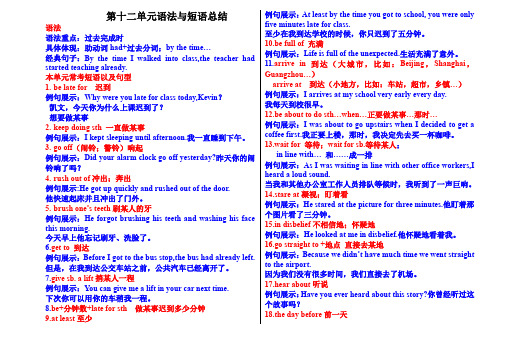
第十二单元语法与短语总结语法语法重点:过去完成时具体体现:助动词had+过去分词;by the time…经典句子:By the time I walked into class,the teacher had started teaching already.本单元常考短语以及句型1.be late for 迟到例句展示:Why were you late for class today,Kevin?凯文,今天你为什么上课迟到了?想要做某事2.keep doing sth 一直做某事例句展示:I kept sleeping until afternoon.我一直睡到下午。
3.go off(闹铃;警铃)响起例句展示:Did your alarm clock go off yesterday?昨天你的闹铃响了吗?4.rush out of冲出;奔出例句展示:He got up quickly and rushed out of the door.他快速起床并且冲出了门外。
5.brush one’s teeth刷某人的牙例句展示:He forgot brushing his teeth and washing his face this morning.今天早上他忘记刷牙、洗脸了。
6.get to 到达例句展示:Before I got to the bus stop,the bus had already left. 但是,在我到达公交车站之前,公共汽车已经离开了。
7.give sb. a lift捎某人一程例句展示:You can give me a lift in your car next time.下次你可以用你的车稍我一程。
8.be+分钟数+late for sth 做某事迟到多少分钟9.at least至少例句展示:At least by the time you got to school, you were only five minutes late for class.至少在我到达学校的时候,你只迟到了五分钟。
人教版九年级全一册英语Unit1单元语法知识点总结
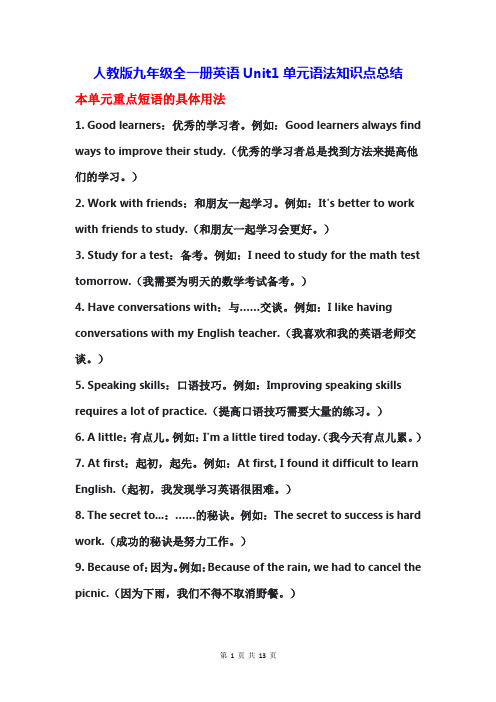
人教版九年级全一册英语Unit1单元语法知识点总结本单元重点短语的具体用法1. Good learners:优秀的学习者。
例如:Good learners always find ways to improve their study.(优秀的学习者总是找到方法来提高他们的学习。
)2. Work with friends:和朋友一起学习。
例如:It's better to work with friends to study.(和朋友一起学习会更好。
)3. Study for a test:备考。
例如:I need to study for the math test tomorrow.(我需要为明天的数学考试备考。
)4. Have conversations with:与……交谈。
例如:I like having conversations with my English teacher.(我喜欢和我的英语老师交谈。
)5. Speaking skills:口语技巧。
例如:Improving speaking skills requires a lot of practice.(提高口语技巧需要大量的练习。
)6. A little:有点儿。
例如:I'm a little tired today.(我今天有点儿累。
)7. At first:起初,起先。
例如:At first, I found it difficult to learn English.(起初,我发现学习英语很困难。
)8. The secret to...:……的秘诀。
例如:The secret to success is hard work.(成功的秘诀是努力工作。
)9. Because of:因为。
例如:Because of the rain, we had to cancel the picnic.(因为下雨,我们不得不取消野餐。
- 1、下载文档前请自行甄别文档内容的完整性,平台不提供额外的编辑、内容补充、找答案等附加服务。
- 2、"仅部分预览"的文档,不可在线预览部分如存在完整性等问题,可反馈申请退款(可完整预览的文档不适用该条件!)。
- 3、如文档侵犯您的权益,请联系客服反馈,我们会尽快为您处理(人工客服工作时间:9:00-18:30)。
英语九年级全一册语法九年级语法学不会?太难掌握?来参考一下我整理收集的语法知识吧。
一起来学习吧英语九年级全一册语法【1】1. what a great day! 多么美好的一天!what fun the water festival is!泼水节是多么有趣啊!how fantastic the dragon boat teams were!那些龙舟队真棒极了!【解析】感叹句一、结构:what (a / an) + adj. + n. + 主+ 谓!how + adj. / adv. +主+ 谓!what beautiful flowers they are !二、what引导的感叹句:1.what + a / an +adj + 单数名词(+主语+ 谓语)!what a nice day (it is)!what an interesting game (they are playing)!2. what + adj + 复数名词(+主语+ 谓语)!what wonderful photos (they are)!what kind people (they are)!3. what + adj + 不可数名词(+主语+ 谓语)!_______ bad weather (it is)!what nice food (he cooks)!三、how引导的感叹句:1.how + adj / adv + 主语+ 谓语!how nice he is!how beautiful the flowers are!2.how + adj + a / an + 单数名词(+主语+ 谓语)!how tall a boy (he is )!how nice a song (she is singing)!3.how + adj / adv + the + 名词+ 谓语!how tall the boy is!how fine the day is!4、what 与how引导的感叹句之间的转换:1.what a beautiful girl she is != ______ beautiful the girl is !2.how delicious the food is != ______ delicious food it is !2.the dragon boat festival in hong kong 香港龙舟节【解析】介词in表地点in用于较大的地点前,如大城市、国家、洲等。
【拓展】at/ in /on 表地点的用法:1)at 一般指较小的地点或较具体的位置at home at school at the cinemaat the door在门口; at the bus stop 在公共汽车站2)in 表示在较大的地点或一个有限空间里.in china in the classroom3)on 指在某物体的表面上. on the desk注意: 写街道时,若有门牌号用at ,否则用on / in 都可.3.bill thinks that the races were not that interesting to watch比尔认为那些比赛观看起来并不那么有趣。
【解析】宾语从句宾语从句即句子作宾语,而不再是一个词或短语作宾语。
i like my teacher.(名词作宾语)i know him .(代词作宾语)i know mr li teaches english. (句子作宾语)包含宾语从句的句子结构:主句+连接词(引导词)+宾语从句什么是宾语从句we know him简单句主s 谓v 宾owe know he likes english.复合句主s 谓v 主s 谓v 宾o宾语从句就是由一个句子来构成主句的宾语考点1:宾语从句的语序:陈述语序,即疑问词+ 主语(名词/代词+谓语(动词)(what,which,who,where,when,why,how等)人/物考点2:宾语从句的时态1. 如果主句的时态是一般现在时,宾语从句该用什麽时态就用什麽时态。
2.如果主句的时态是一般过去时,宾语从句只能用相应的过去时态(一般过去时,过去进行时,过去将来时,过去完成时)。
3.如果宾语从句所陈述的是客观真理,其时态常用一般现在时。
英语九年级全一册语法【2】spend,cost,,pay,take:spend on sth;spend in dong;sth cost ab money 注意:cost的三种形式都是cost;it take ab+时间+to do;pay ab money for区分the other,another,other, others,the others the other:两者范围内特指另一个;another:三者或三者以上的人或事物中任意的另一个;other:后接复数名词,意为其他的;others:others=other+复数名词,可用some any all修饰have to意为不得不very意可为真正的stay意为保持某种状态,可与keep互换besides意为除...之外(还有) except意为除...以外(不包括在内) instead放在句末instead of后面为ing形式in...way以什么方式some...some....others意为一些...一些...另一些....make ab do-使某人做某事make ab adj-使某人怎样make ab n-使某人成为lead/have/live a......adj+life可以修饰比较级的词:far,much,even,still,a lot,a littleused to do-过去常常做某事be used to doing-习惯做某事regard as后面可接名词和形容词by accident-偶然地,小心地by mistake 错误地英语里常用“数字-名词”或“数字-名词形容词” ps:一个七岁的男孩:7-year-old boymiss doing-错过做某事miss还有“想念”的意思be upset(about)对...感到不安express-表达词组:express ones feelings-表达某人感情;express ones thought-表达某人想法;express ones idea-表达某人主意go on可以为“事件发生”ps:it seem that the player will go on好像戏剧要开始了;go on doing sth-继续做某事(不停地做某一件事);go on with sth-继续做某事(停下来之后继续做某件事);go on to do sth-继续做某事(做完一件事,继续做另一件事)keep on doing-一直做某事;keep sb doing-使某人一直做某事;keep sth+adj使某人保持某种状态adj enough not to do-足够...不去做not adj enough to do-不足够...去做advice-忠告(不可数名词)词组:a piece of advice-一条意见;ask for ones advice about-征求某人对...的忠告;against ones advice about-违背某人忠告;by doctors advice-遵照医嘱;some adviceabout-一些关于...的劝告suggestion-意见,建议;词组:adopt a suggestion-采纳建议;by ones suggestion-根据某人建议。
suggestion的动词形式是suggest,用法:suggest doing。
opinion与suggestion相似,但不如suggestion正是,比advice 客气,词组:in ones opinionplenty of-很多,可修饰可数或不可数名词,多用于肯定句中;a number of-许多,相当于many,修饰可数名词,注意:the number of-...的数量;an amount of-大量的,多用于不可数名词,amount 前可用large,small等修饰程度;a lot of/lots of-很多,可用于修饰可数或不可数名词so that-以便,为了;so...that...-如此...以至于focus on-致力于... aim to do-目的在于做... apply for-申请in the case of-...的情形下further和farther都是far的比较级,farther表示具体距离的远近,further表示抽象概念last:the last-最后at last-终于last day-上一天last for-持续;final-最终的决胜的;决赛,最终考试;at last=finallyhurt用于有生命的东西;damage用于无生命的东西对其价值和功能的损坏,破坏程度较小;injure与hurt相近,只是更正式,用于天灾或事故中;destroy很粗鲁的手段使之毁灭,很难修复good:人品好,质量好,向别人问好;well:身体好,或作副词;nice:带有感情色彩,外观好,待人感情好;excellent-极好的,语气最强be busy doing=be busy with=忙于做某事beneath-在..之下(紧贴之下) under-在...下方(垂直向下) over-在...上方(垂直向上) below-在...之下(位置低于),可用于表示数目低于,其反义词为aboveuntil-直到...为止;not...until-直到...才although=though=虽然,尽管;although较为正式,用于句首;though更通俗常用;只要用了although或though就不能用but,and,or等连词such as-例如,后面接单词或词组;for example常用逗号分开,后面常根句子be(后省略)concerned about-关心;difficult to和...不同;be proud of为...自豪curious about认真;free for免费;afraid of害怕;serious about严肃;unaware of没注意;strict with严格;responsible for...的责任;useful for对...有用; equal to对...公平;famous for对...出名;aware of直到;grateful to对...感激;careful of小心;tired of对..感到疲累with、in都是介词,in用于衣服的颜色;with多指穿“戴眼镜,帽子”,或是衣服上的装饰;put on-穿上、戴上,强调动作;wear强调穿着的状态;dress意为“给某人穿衣服”join表示加入党派,社会团体,表示成为其中一员;join in表示参加某项正在进行的活动,词组:join in sth /join sb in doing-参加某人的活动;take part in参加运动会、会议或工作,参加群众性活动起一份作用;attend参加会议,主要以观众或听众的身份写family-家庭成员house-房屋home-家乡room-房间one可以做不定代词,代替前面提过的人或物(单数),如果是复数则是onespresent-上演、演出,作形容词时意为“在场的、目前的”,作名词时意为“目前,礼物”find out-发现、查出,可指找到无形的东西;find-找到,通常指寻找的结果,有偶然发现的意思in trouble-遇到麻烦;in pain-疼痛;in love-在恋爱中。
